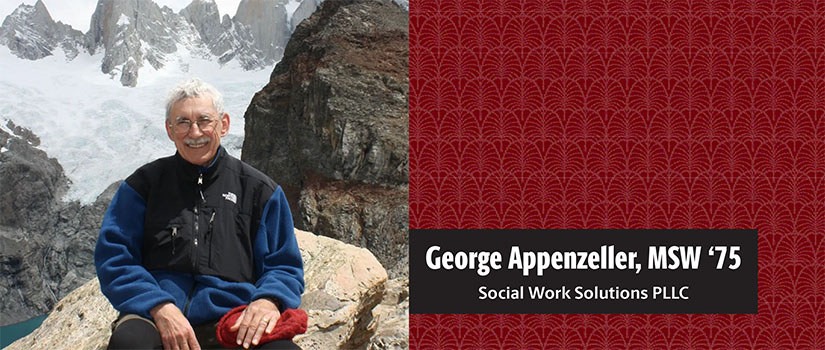Oct. 29, 2020
Chris Woodley • cwoodley@mailbox.sc.edu
According to the National Association of Social Workers Summer 2019 newsletter, Practice Perspectives, the accelerating rate of climate change is a threat to human health. The article also stated that the professional commitment to underserved and vulnerable populations necessitates that social workers are knowledgeable about climate change and its effects on people. One alum has witnessed the effects of climate change worldwide and is committed to advocating for change and training social workers to help protect the environment for future generations.
George Appenzeller, MSW ’75, has had a life-long interest in the environment. A career assessment test in high school revealed that the best careers suited for him were a social worker and forest service ranger. He remembered these results upon returning to Columbia after serving in the military.
“The College of Social Work had been established once I returned,” Appenzeller says. “I was interested in social work because I was doing a lot of volunteer work, and I thought about the career recommendations of being a social worker, so I figured that this was my chance.”
Appenzeller earned his Master of Social Work degree and served in various social work positions for the South Carolina state government for 22 years. Afterwards, Appenzeller and his wife Sarah Meadows, a 1974 MSW alum whom he met at the College of Social Work, co-founded System Wide Solutions, a social work practice that offered research and evaluation services. They turned their practice over to colleagues last year and intended to retire. But Appenzeller’s retirement was short-lived when he decided to start a new practice that combined his social work expertise and interests in climate change and environmental issues. Social Work Solutions PLLC was established in June 2019 to be a catalyst for creating a successful response to climate change among social workers, social work organizations and public and private policy makers.
“I started out by doing presentations, particularly for NASW in North Carolina and South Carolina, by providing information and creating a video on how social work is involved in climate change,” Appenzeller says. “More people became involved, and we started doing trainings and events, which have continued virtually due to COVID-19. I also do consultations with those interested in climate change, particularly younger social workers, who tend to be more interested since it will have a greater effect on them.”
According to Appenzeller, climate change social work is applied on micro (one-on-one), mezzo (local) and macro (state and national) levels. Climate change creates larger problems on the micro level for people who social workers already work with and serve.
“This includes people who are underemployed and living in poor housing, or those affected by hurricanes and fires,” Appenzeller says. “Their needs increase because climate change is a multiplier of problems, and social workers need to address how people can overcome them.”
Examples of helping combat climate change on the mezzo level include using alternative fuels for public transportation or changing how people heat or cool their homes. Appenzeller and his wife’s work in their community of Hillsborough, North Carolina has led to environmental changes. In the last three years, they successfully advocated for all county building to stop using fossil fuels for heating and cooling systems. They also worked with the city council to change grass cutting regulations.
“When grass is continuously cut, it decomposes, releases carbon and methane, and kills insects that birds depend on,” Appenzeller says. “The new regulations no longer require residents to cut their lawns and allows them to let their lawn grow or plant native flowers. Environmental justice on the mezzo level involves issues that middle-class communities often dump on others. It takes organizing the community for others to see the problem and find solutions.”
The macro level works towards major policy changes at the county, state and federal levels. This includes reducing the amount of carbon, methane, and other substances released that create human-made climate change. According to Appenzeller, this is when working with organizations such as NASW is important.
“Climate change cuts across social work in general,” Appenzeller says. “Our profession is supposed to be based on person in environment, and the natural environment is just as important as the ones we create for ourselves.”
As part of his work with his practice, Appenzeller and his wife have traveled throughout the world to witness the effects of climate change and how populations adapt. For example, in the Gobi Desert region of southern Mongolia, areas that were grasslands as recently as 10 to 20 years ago have turned into desert. Another trip was to the South American region of Patagonia, home to the world’s third-largest ice field, which is rapidly retreating.
“We learned how natives adapt to changing conditions in the Gobi Desert,” Appenzeller says. “Even though they are nomadic, they must move more often to find food for their animals because the grass and trees have died. This is something that could happen in some parts of the U.S. as deserts increase in size.
We travel to see how the land, people and wildlife are affected, and what we can bring back to predict what the environment will look like in our country as the climate continues to change. We can then pass that information on to other social workers so they can start preparing.”
Appenzeller also provides climate change awareness training to social workers. The training includes understanding the term climate change and answers why it occurs, the scientific aspects, and what causes the Earth to heat and cool.
“We give an overview of climate change, talk about how it relates to those affected, and explain how it relates to social work values,” Appenzeller says. “The specific actions social workers should take are also discussed. I would eventually like to present to larger organizations and practices and help them plan how to react and how they can affect bigger changes.”
